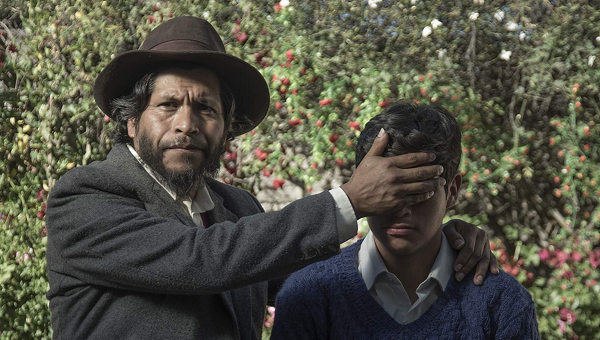We may be just a few weeks from Easter, but I was only recently able to watch two of Disney's three big Christmas 2018 movies: The Nutcracker and the Four Realms and Ralph Breaks the Internet. The wonderful Mary Poppins Returns was the studio's third holiday release. Now, thanks to the (Disney?) magic of home video, everyone can watch all three!
The Nutcracker and the Four Realms is a visually-sumptuous if rather simple-minded fantasy that references virtually every prior incarnation of E.T.A. Hoffman's classic Yuletide tale. There is a ballet sequence featuring acclaimed dancer Misty Copeland, portions of Tchaikovsky's famous music amidst a film score otherwise composed by James Newton Howard, and even visual echoes of Disney's own Fantasia, with conductor Gustavo Dudamel featured in silhouette at times à la Fantasia's conductor Leopold Stokowski.
This latest film adaptation is an adventure involving young heroine Clara's search for a magical key that will presumably open a mysterious Fabergé-esque egg left to her by her late mother. Her search naturally commences on Christmas Eve and leads her into the distinctive four realms of the title. War is brewing within this colorful world, which is reportedly being provoked by the villainous Mother Ginger.
Helen Mirren does the best she can with the underwritten role of Mother Ginger, while Morgan Freeman has little more than a cameo as the one-eyed inventor Drosselmeyer. Meanwhile, Keira Knightley is a campy hoot as the Sugarplum Fairy and recent Oscar nominee Richard E. Grant is fittingly entertaining as the icicle-festooned regent of the Snow Realm. Relatively unknown leads Mackenzie Foy and Jayden Fowora-Knight fare best as, respectively, Clare and her nutcracker prince. Kudos to the casting director, by the way, for incorporating both Fowora-Knight and Freeman into what has historically been a European (i.e. totally Caucasian) story.
Nutcracker is visually over-the-top at times but features some memorable images and moments. It was chiefly directed by Oscar nominee Lasse Hallström (Chocolat, The Cider House Rules) but veteran Joe Johnston (The Rocketeer, Captain America: The First Avenger) provided a month of reshoots to beef up the action sequences and special effects. The result feels schizophrenic at times, as Hallström's more restrained sensibility clashes with Johnston's super-heroic approach. Disney's expensive production didn't do well at the box office as it was competing against the studio's own Ralph Breaks the Internet as well as The Grinch. However, future holiday viewers and generations may yet embrace this diverse, imaginative take on a Christmas classic.
Ralph Breaks the Internet, meanwhile, is a long-awaited sequel to 2012's Wreck-It Ralph. John C. Reilly once again voices the titular video game character, with Sarah Silverman also back as Ralph's misfit friend, Vanellope von Schweetz. I'm a little embarrassed to admit that Wreck-It Ralph is one of only three animated films by Disney or Pixar that I've never seen. Thankfully, seeing the original isn't essential to appreciating this clever, funny sequel, which was an Academy Award nominee this year for Best Animated Feature.
It's frequently satirical screenplay involves the search for an essential part to Vanellope's favorite retro video game. Locating it initially on eBay, Ralph and Vanellope venture into the internet only to find things much more complicated than they anticipated. Co-directors Phil Johnston and Rich Moore, along with their design team, make visual sport of practically every popular website as well as Disney's stable of princesses, Star Wars figures, and other beloved characters. As amusing as these elements are, Ralph Breaks the Internet becomes self-indulgent in this regard and ultimately overlong at 112 minutes. Most viewers won't care. It is a successful sequel that inspires me to finally watch its predecessor!
From Disney's latest we journey to a bevy of new gay-themed releases, including one bonâ fide classic just released on Blu-ray for the first time. Death in Venice is Italian filmmaker Luchino Visconti's acclaimed yet provocative adaptation of Thomas Mann's novella. The Criterion Collection just issued a beautifully restored, 4K edition of this 1971 film. The Blu-ray also boasts a number of documentaries including a pair of short, behind-the-scenes exposés directed by Visconti.
Dirk Bogarde gives a gutsy-for-the-time, nuanced performance as Gustav von Aschenbach, a once celebrated composer in the waning years of his career. During a recovery holiday in the title city, Gustav unexpectedly becomes smitten with a pubescent boy named Tadzio (played by the appropriately fetching Bjorn Andresen). Sadly, Gustav also finds himself afflicted by a cholera epidemic that is quietly sweeping Venice. Art, beauty, innocence, love and death ultimately collide in Visconti's elegant reflection on these themes.
The film's depiction of Gustav's obsession with Tadzio – and vice versa to some degree – is disturbing, both by 1970's standards and today's. However, the ultimate sin presented in Death in Venice isn't homosexuality but growing older. As one character wryly remarks, "There is no impurity so impure as old age." Selections from symphonies by Gustav Mahler provide perfect musical accompaniment, while Piero Tosi's Oscar-nominated costumes are similarly sublime. Whether you have never seen it or will be experiencing it again, it's time to take a trip to Venice.
Love, desire and sexy guys in frequent stages of undress occupy TLA Releasing's new releases Woke and He Loves Me. The Woke DVD is actually season one of a French series entitled Les Engagés (The Engaged). The original title is actually more appropriate, especially given how US-specific the current popular use of the term "woke" seems to me to be. At any rate, its plot is chiefly set in and around an LGBTQ outreach center in Lyon, France. A local politician has cut off the center's funding, sparking a political revolt on the part of its staff members led by resident activist Thibaut (dreamy, mustachioed Eric Pucheu). Thibaut's personal life is thrown into turmoil when a Muslim runaway, Hicham (Mehdi Meskar), shows up on his doorstep. The two met years earlier at a campground and Hicham has carried a torch for Thibaut ever since. Woke features a few dated, clichéd scenes regarding gay self-acceptance but is generally an engrossing production.
He Loves Me is a sensual first feature by Greek filmmaker Konstantinos Menelaou. It opens with two attractive, naked guys lying on a beach together. We learn that they are a couple at a crossroads in their relationship. Their current seaside vacation is actually a "make it or break it" attempt to reconcile their differences. The characters, played by Hermes Pittakos and Sanuye Shoteka, are largely silent while thoughtfully-written narration reflects on the couple's experience. Viewers are ultimately informed/reminded that love takes a lifetime of work. The movie feels a bit meandering and long toward its end, and it's only 72 minutes long. But the abundant nudity on display, Kostis Fokas' beautiful sun-dappled cinematography, and Micke Lindebergh's Enya-esque music score weave a seductive, romantic spell.
Reverend's Ratings:
The Nutcracker and the Four Realms: B-
Ralph Breaks the Internet: B+
Death in Venice: A-
Woke (Les Engagés): B-
He Loves Me: B
Review by Rev. Chris Carpenter, resident film and stage critic of Movie Dearest and Rage Monthly Magazine.















